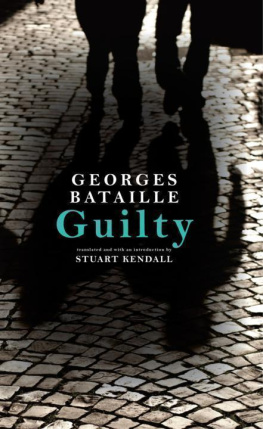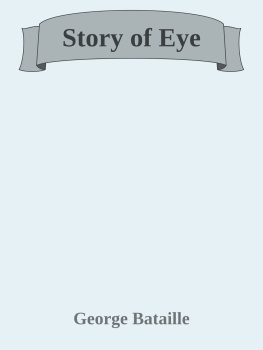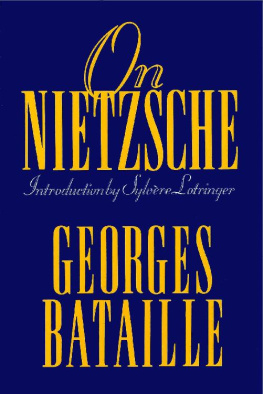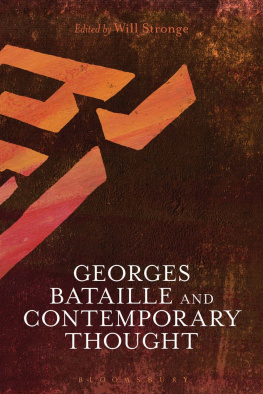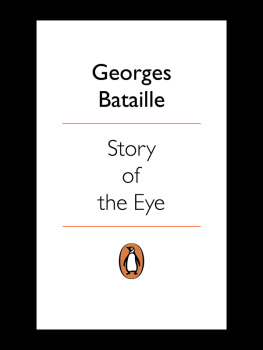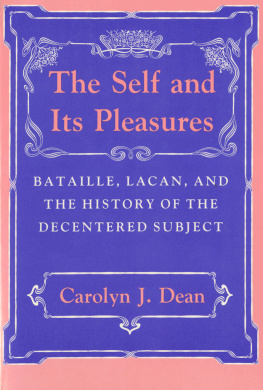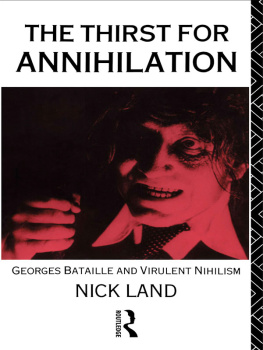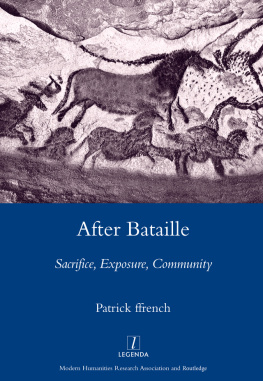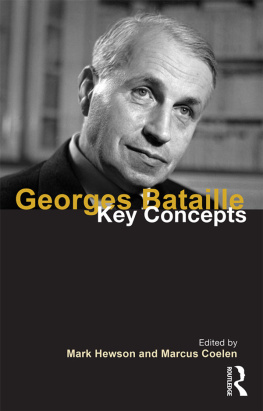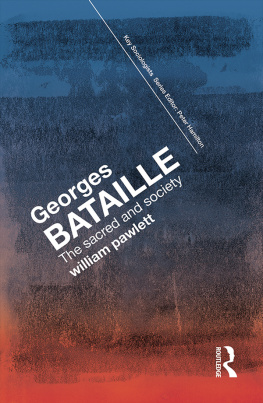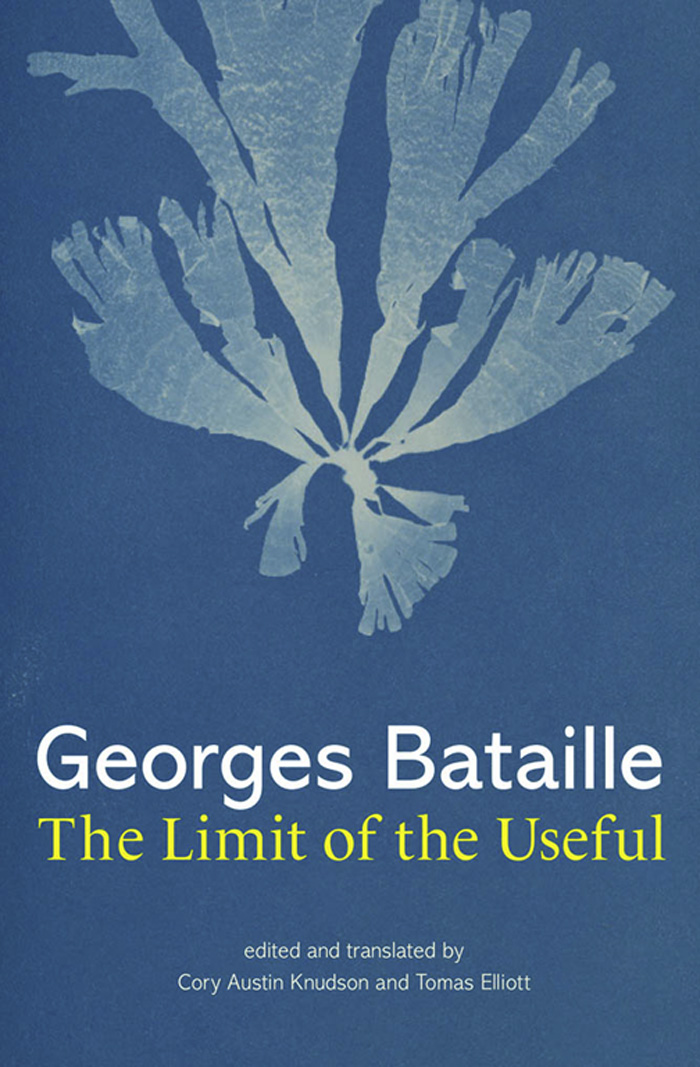
The Limit of the Useful
The Limit of the Useful
Georges Bataille
edited and translated by Cory Austin Knudson and Tomas Elliott
The MIT Press
Cambridge, Massachusetts
London, England
2022 Massachusetts Institute of Technology
Originally published as Lconomie la mesure de lunivers, La Limite de lutile, Notes pour Lconomie la mesure de lunivers, and Notes pour La Limite de lutile Editions Gallimard, Paris, 1976
All rights reserved. No part of this book may be reproduced in any form by any electronic or mechanical means (including photocopying, recording, or information storage and retrieval) without permission in writing from the publisher.
This book was set in Century Schoolbook Pro by New Best-set Typesetters Ltd.
Library of Congress Cataloging-in-Publication Data
Names: Bataille, Georges, 18971962, author. | Knudson, Cory Austin, editor. | Elliott, Tomas, editor.
Title: The limit of the useful / Georges Bataille ; edited and translated by Cory Austin Knudson and Tomas Elliott.
Description: Cambridge, Massachusetts : The MIT Press, [2023] | Originally published as Lconomie la mesure de lunivers, La Limite de lutile, Notes pour Lconomie la mesure de lunivers, and Notes pour La Limite de lutile, Editions Gallimard, Paris, 1976. | Includes bibliographical references.
Identifiers: LCCN 2022000765 (print) | LCCN 2022000766 (ebook) | ISBN 9780262047333 | ISBN 9780262371353 (ebook) | ISBN 9780262371360 (pdf)
Subjects: LCSH: Bataille, Georges, 18971962. | Bataille, Georges, 18971962. Part maudite. | Economics.
Classification: LCC B2430.B33952 E5 2023 (print) | LCC B2430.B33952 (ebook) | DDC 194dc23/eng/20220815
LC record available at https://lccn.loc.gov/2022000765
LC ebook record available at https://lccn.loc.gov/2022000766
10 9 8 7 6 5 4 3 2 1
d_r0
Contents
Introduction
Cory Austin Knudson and Tomas Elliott
The Tale of a Despair
By the end of the 1930s, Georges Bataille had been many things. He had been a dissident surrealist, numismatist, antifascist activist, the founder of a secret society, and the editor of several journals. These ranged from the now-legendary Documents to the short-lived Contre-Attaque. As an author, he had become notorious as the writer behind the scandalizing and pseudonymously published pornographic fiction Story of the Eye. He participated in or organized scholarly convocations for which the lists of participants read like a whos who of the French interwar intelligentsia. Chief among these were Alexandre Kojves seminars on The Phenomenology of Spirit, as well as Batailles own College of Sociology, whose attendees included Roger Caillois, Michel Leiris, Hans Mayer, Jean Paulhan, Jean Wahl, Raymond Queneau, and Georges Duthuit. By the end of the 1930s, however, there was one thing Bataille was not. He was not the author of a scholarly monograph.
He had attempted two such endeavors over the course of the decade. In one, he planned to investigate the structure and rise of fascism in France. His 1933 essay The Psychological Structure of Fascism was the basis for this work. The other was projected to center on the work of Lev Shestov, the mentor who so consequentially introduced Bataille to the thought of Friedrich Nietzsche in 1922 or 1923, when he was fresh from his medievalist studies at the cole des Chartes and still nursing pretensions of becoming a priest. Neither book would come to fruition. In 1939 Bataille would make still another attemptthis time, on a book centering entirely on the elaboration of his own ideas. But again, he would fall short of his objective.
When Inner Experience appeared in 1943the first book to bear the name of Georges Bataille on the coverhe included a preface in which he describes the work as the tale of a despair. This tale, as one might guess, has a lot to do with the clear difficulty Bataille had with writing a book that adequately expressed his anti-philosophical philosophy. In fact, given what we know now, the tale has specifically to do with that third book he attempted to write in the 1930sthe book that, in Inner Experience, Bataille goes so far as to claim encapsulated his most profound philosophical reflections. In this nascent masterwork, he says,
I actually went to the end of problems whose novelty and scope exalted me. Entered into unexpected regions, I saw what eyes have never seen. Nothing more intoxicating: laughter and reason, horror and light became penetrable.... There was nothing that I did not know, that was not accessible to my fever. Like some marvelous madwoman, death opened ceaselessly or closed the doors of the possible. In this labyrinth, I could lose myself at will, give myself over to ravishment, but I could discern the paths at will, pick a precise passage with intellectual steps. The analysis of laughter had opened before me a field of correspondences between the data of a communal and decisive emotional knowledge and those of discursive knowledge. Losing themselves in one another, the contents of various forms of expenditure (laughter, heroism, ecstasy, sacrifice, poetry, eroticism or others) defined among themselves a law of communication ordering the play of the isolation and the loss of beings. The possibility of uniting at a precise point two kinds of knowledge hitherto strangers to one another or otherwise crudely confused gave this ontology its unhoped-for consistency: the entire movement of thought lost itself, but all at once found itself again, in a point at which the unanimous crowd laughs. Therein I experienced a feeling of triumph: perhaps illegitimate, premature?... It does not seem so to me. I rapidly felt what came upon me as a weight. What rattled my nerves was to have achieved my task: my ignorance turned to insignificant points, more enigmas to solve! Everything crumbled! I awoke before a new enigma, and I knew all at once that this one was insoluble: this enigma was even so bitter, it left me in an impotence so crushing that I experienced it as God, if he exists, would have experienced it.
Three-quarters finished, I abandoned the work wherein the resolved enigma could be found.
This mysterious preliminary manuscript to Inner Experiencesupposedly abandoned in despair by its author at the very point where it allowed him to achieve [his] taskis The Limit of the Useful.
Bataille, of course, is given to exaggeration. Presented here for the first time in English, The Limit of the Useful was never truly abandoned and it does not articulate some esoteric and supreme enigma that would confound even the mind of God. (If he exists, as its author hedges.) What it does do is present some of Batailles most extensive and original reflections on, for example, the history and structure of sacrifice, the fraught interplay between glory and greed in military conquest, and the role of speculation in the machinery of capitalism. Remarkably, it is also his most structurally consistent work even as it is his least complete. And we do indeed find herein a detailed elaboration of his theory of laughtera topic that Bataille refers to frequently throughout his works but never lays out as systematically as he does here. Most importantly, this text offers a profound exploration of what in the preface to Inner Experience Bataille would call the law of communication ordering the play of the isolation and the loss of beings. This is the key that opened ceaselessly or closed the doors of the possible, the Ariadnes thread that led him through the labyrinth, the winnow that gave his abandoned ontology its unhoped-for consistency.
Next page

